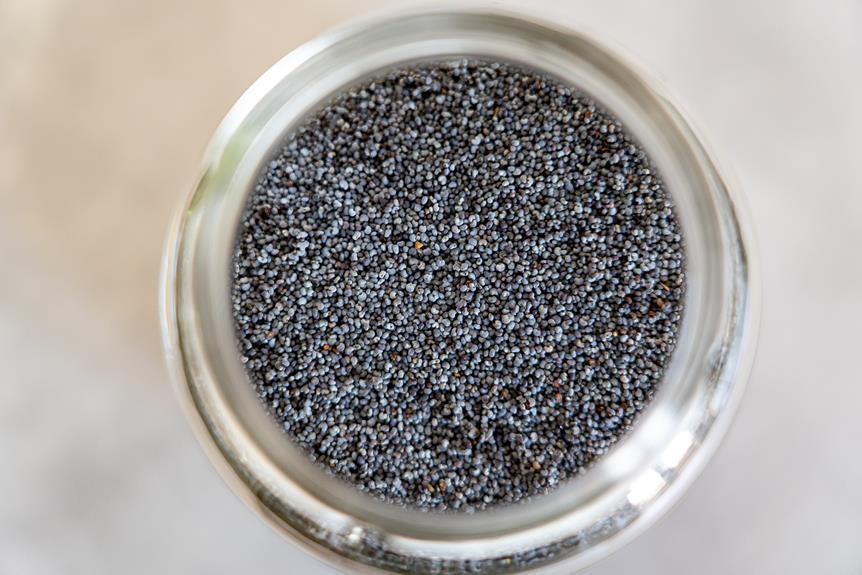You've heard the saying, "You are what you eat." Well, it turns out that this old adage holds true when it comes to digestive wellness. The latest discoveries in the world of nutrition have revealed the importance of high fiber foods in promoting a healthy digestive system. But what exactly are these fiber-rich foods and how can they benefit you? Stay tuned as we uncover the secrets behind the latest high fiber discoveries that are sure to leave you wanting more.
Key Takeaways
- Dietary fiber is essential for maintaining a healthy digestive system and preventing constipation.
- Consuming a variety of fiber sources, such as fruits, vegetables, whole grains, legumes, and nuts, is important for meeting daily fiber needs.
- Fiber intake promotes satiety, lowers cholesterol levels, controls blood sugar, and supports gut health.
- Soluble fiber lowers cholesterol and regulates blood sugar, while insoluble fiber promotes regular bowel movements and maintains colon health.
Benefits of Dietary Fiber
Eating high fiber foods offers numerous benefits for your digestive wellness. Fiber is an essential nutrient that plays a crucial role in maintaining a healthy digestive system. One of the main benefits of dietary fiber is that it helps prevent constipation. By adding bulk to your stool, fiber helps move waste through your intestines more efficiently, making it easier to pass. This can help alleviate the discomfort and bloating associated with constipation.
Another benefit of consuming high fiber foods is that it promotes regular bowel movements. Fiber acts as a natural laxative, stimulating the muscles in your intestines to contract and move waste along. This can help prevent gastrointestinal issues such as diverticulosis and hemorrhoids.
In addition to aiding digestion, fiber also helps regulate blood sugar levels. When you eat foods high in fiber, they are digested more slowly, which results in a slower and steadier release of glucose into the bloodstream. This can help prevent spikes and crashes in blood sugar, making it beneficial for individuals with diabetes or those trying to manage their blood sugar levels.
Furthermore, a high fiber diet can contribute to maintaining a healthy weight. Fiber-rich foods tend to be more filling and satisfying, which can help prevent overeating and promote weight loss. Additionally, fiber has a low caloric density, meaning it provides fewer calories per gram compared to other nutrients.
To reap the benefits of dietary fiber, it is recommended to consume a variety of high fiber foods such as fruits, vegetables, whole grains, legumes, and nuts. Aim to gradually increase your fiber intake and drink plenty of water to help the fiber move through your digestive system effectively.
Recommended Daily Fiber Intake
To maintain a healthy digestive system, it is important for you to meet your recommended daily fiber intake. Consuming enough fiber has numerous health benefits, such as promoting regular bowel movements and preventing constipation. You can obtain dietary fiber from a variety of sources, including fruits, vegetables, whole grains, legumes, and nuts.
Importance of Fiber Intake
Consuming an adequate amount of fiber is crucial for maintaining proper digestive wellness and overall health. Fiber plays a vital role in promoting regular bowel movements, preventing constipation, and keeping your digestive system healthy. Here are five reasons why fiber intake is important:
- Promotes satiety: High-fiber foods help you feel full for longer, reducing the chances of overeating and aiding in weight management.
- Lowers cholesterol levels: Soluble fiber binds to cholesterol in the body, preventing its absorption and reducing the risk of heart disease.
- Controls blood sugar: Fiber slows down the digestion and absorption of carbohydrates, helping to stabilize blood sugar levels.
- Supports gut health: Fiber acts as a prebiotic, serving as food for beneficial gut bacteria and promoting a healthy gut microbiome.
- Reduces the risk of certain diseases: A high-fiber diet has been linked to a lower risk of conditions like obesity, type 2 diabetes, and colorectal cancer.
Make sure to incorporate fiber-rich foods into your diet to reap these health benefits and maintain optimal digestive wellness.
Health Benefits of Fiber
To achieve the health benefits of fiber and meet the recommended daily fiber intake, incorporating fiber-rich foods into your diet is essential. Fiber offers a range of advantages for your overall well-being, particularly for your digestive system. It aids in maintaining regular bowel movements, preventing constipation, and promoting a healthy gut. Additionally, fiber can help control blood sugar levels, lower cholesterol levels, and support weight management by promoting feelings of fullness. To give you a better understanding of the fiber content in different foods, here is a table showcasing examples of high-fiber foods:
| Food | Fiber Content (per 100g) |
|---|---|
| Chia seeds | 34g |
| Lentils | 8g |
| Avocado | 7g |
| Whole wheat bread | 6g |
Sources of Dietary Fiber
Incorporating sources of dietary fiber into your daily meals is crucial to meet the recommended daily fiber intake. Here are five high-fiber foods you should consider adding to your diet:
- Legumes: Beans, lentils, and peas are excellent sources of fiber. They can be easily incorporated into soups, salads, or stews.
- Whole Grains: Opt for whole wheat bread, brown rice, quinoa, or oatmeal to increase your fiber intake. These grains provide essential nutrients along with fiber.
- Fruits and Vegetables: Include a variety of fruits and vegetables in your meals. Apples, berries, broccoli, carrots, and avocados are great options packed with fiber.
- Nuts and Seeds: Almonds, chia seeds, flaxseeds, and walnuts are fiber-rich snacks that can be enjoyed on their own or added to yogurt, smoothies, or salads.
- Bran: Wheat bran and oat bran can be sprinkled on breakfast cereals, yogurt, or used in baking to boost your fiber intake.
Soluble Vs. Insoluble Fiber
Are you confused about the difference between soluble and insoluble fiber? Well, you're not alone. Understanding the benefits of each type of fiber is essential for maintaining a healthy digestive system. Let's break it down and explore the unique advantages that soluble and insoluble fiber offer.
Fiber Types Explained
Understanding the difference between soluble and insoluble fiber is essential for maintaining digestive wellness. Soluble fiber dissolves in water and forms a gel-like substance in the digestive system. On the other hand, insoluble fiber does not dissolve in water and adds bulk to the stool. Here are some key points to differentiate between the two:
- Soluble fiber:
- Helps lower cholesterol levels
- Slows down digestion, promoting a feeling of fullness
- Regulates blood sugar levels
- Found in foods like oats, beans, fruits, and vegetables
- Helps nourish beneficial gut bacteria
- Insoluble fiber:
- Promotes regular bowel movements
- Prevents constipation
- Adds bulk to the stool
- Found in foods like whole grains, nuts, and seeds
- Helps maintain colon health
Benefits of Each
To fully understand the benefits of soluble and insoluble fiber, it's important to consider how each type contributes to digestive wellness. Soluble fiber, found in foods like oats, beans, and fruits, dissolves in water and forms a gel-like substance in the digestive system. This gel slows down digestion, helping to regulate blood sugar levels and lower cholesterol. It also promotes the growth of beneficial bacteria in the gut, which aids in overall digestive health. On the other hand, insoluble fiber, found in foods like whole grains, nuts, and vegetables, adds bulk to the stool and helps prevent constipation. It also helps to keep the digestive system regular and prevent the risk of developing certain digestive disorders, such as diverticulosis. Including both types of fiber in your diet is crucial for maintaining a healthy digestive system.
Top High Fiber Fruits
Including a variety of high fiber fruits in your diet can greatly contribute to your digestive wellness. Fruits are not only delicious but also packed with essential nutrients and dietary fiber that can promote healthy digestion. Here are some top high fiber fruits to consider adding to your daily diet:
- Raspberries: These small yet mighty fruits are an excellent source of fiber, providing around 8 grams per cup. They are also rich in antioxidants, which can help protect your cells from damage.
- Avocado: Yes, avocados are fruits! They are not only creamy and delicious but also high in fiber. One medium-sized avocado contains approximately 9 grams of fiber, making it a great choice for digestive health.
- Pears: Pears are not only juicy and refreshing but also high in fiber. They contain both soluble and insoluble fiber, which can help promote regular bowel movements and prevent constipation.
- Apples: The saying "an apple a day keeps the doctor away" holds true when it comes to digestive health. Apples are high in fiber, particularly pectin, a soluble fiber that can help improve digestion and promote a healthy gut.
- Bananas: Bananas are not only a convenient and portable snack but also a great source of fiber. One medium-sized banana contains approximately 3 grams of fiber, making it a satisfying and digestive-friendly choice.
High Fiber Vegetables to Include in Your Diet
Consider incorporating a variety of high fiber vegetables into your diet for improved digestive wellness. Vegetables are not only packed with essential vitamins and minerals, but they also contain a significant amount of fiber, which plays a crucial role in maintaining a healthy digestive system. Including high fiber vegetables in your meals can help regulate your bowel movements, prevent constipation, and promote overall gut health.
One vegetable that is renowned for its high fiber content is broccoli. Just one cup of cooked broccoli contains around 5 grams of fiber, making it an excellent choice for boosting your daily fiber intake. Another fiber-rich vegetable is Brussels sprouts, which provide about 4 grams of fiber per cup. These tiny green vegetables are not only delicious but also offer numerous health benefits, including improved digestion.
Additionally, artichokes are an excellent source of dietary fiber. One medium-sized artichoke contains approximately 10 grams of fiber, making it one of the highest fiber vegetables available. Artichokes are also rich in antioxidants and can aid in reducing inflammation in the digestive tract.
Another vegetable to consider is spinach. This leafy green vegetable is not only high in iron but also provides a good amount of fiber. One cup of cooked spinach contains around 4 grams of fiber. Moreover, spinach is versatile and can be easily incorporated into various dishes, such as salads, soups, or smoothies.
Lastly, don't forget about carrots. Carrots are not only crunchy and delicious but are also a great source of fiber. One medium-sized carrot contains approximately 2 grams of fiber. Including carrots in your diet can help promote regular bowel movements and support a healthy digestive system.
Whole Grains for Digestive Health
Are you looking to improve your digestive health? Incorporating whole grains into your diet can be a beneficial step towards achieving optimal digestive wellness. Whole grains are packed with fiber, vitamins, and minerals that support a healthy digestive system. Here are five reasons why you should consider adding whole grains to your diet:
- Fiber Power: Whole grains are rich in dietary fiber, which aids in proper digestion and prevents constipation. Fiber adds bulk to your stool, making it easier to pass through the digestive tract and promoting regular bowel movements.
- Gut Health: Whole grains act as prebiotics, nourishing the beneficial bacteria in your gut. These bacteria help break down food, produce essential nutrients, and support a strong immune system. By promoting a healthy gut microbiome, whole grains contribute to overall digestive wellness.
- Reduced Risk of Digestive Disorders: Studies have shown that consuming whole grains regularly can lower the risk of developing digestive disorders such as diverticulosis, hemorrhoids, and inflammatory bowel disease. The high fiber content in whole grains helps maintain a healthy colon and prevents inflammation.
- Heart Health: Whole grains are heart-healthy foods that can lower the risk of heart disease. They help reduce cholesterol levels, regulate blood pressure, and improve overall cardiovascular health. A healthy heart is essential for optimal digestion and nutrient absorption.
- Weight Management: Whole grains are nutrient-dense and provide a feeling of fullness, making it easier to control your appetite and manage your weight. By incorporating whole grains into your meals, you can maintain a healthy weight, which is beneficial for your digestive system.
Other High Fiber Foods to Try
To diversify your fiber intake and enhance your digestive wellness, explore these additional high fiber foods. Adding variety to your diet not only ensures you get a wide range of nutrients, but it also keeps your taste buds happy. So, let's dive into some other high fiber foods that you can try.
One excellent source of fiber is legumes. Chickpeas, lentils, and black beans are all packed with fiber and can easily be incorporated into your meals. You can toss them into salads, blend them into soups, or even make a delicious hummus dip. Another great option is chia seeds. These tiny seeds are rich in fiber and can be added to smoothies, oatmeal, or yogurt for an extra boost.
Berries are not only delicious but also high in fiber. Strawberries, raspberries, and blackberries are all great choices. You can enjoy them on their own, add them to your cereal, or blend them into a refreshing smoothie. And don't forget about nuts and seeds. Almonds, walnuts, flaxseeds, and sunflower seeds are all high in fiber and make for a nutritious snack or a crunchy topping for your salads.
If you're a fan of cruciferous vegetables, you're in luck. Broccoli, Brussels sprouts, and cauliflower are not only packed with vitamins and minerals but also high in fiber. You can steam them, roast them, or even chop them up and add them to stir-fries.
Lastly, quinoa and oats are two whole grains that are also high in fiber. Quinoa can be used as a base for salads or as a side dish, while oats can be enjoyed as a warm bowl of oatmeal or added to baked goods for a fiber boost.
Incorporating these high fiber foods into your diet can help improve your digestive wellness and overall health. So, why not give them a try and see how they make you feel? Your gut will thank you!
Frequently Asked Questions
Can High Fiber Foods Help With Weight Loss?
High fiber foods can indeed help with weight loss. By incorporating high fiber foods into your diet, you can feel fuller for longer periods of time, which can help reduce overall calorie intake. Additionally, fiber aids in digestion and can help regulate blood sugar levels. Some examples of high fiber foods include fruits, vegetables, whole grains, and legumes. So, if you're looking to shed some pounds, consider adding more high fiber foods to your meals.
Are There Any Potential Side Effects of Consuming Too Much Fiber?
Consuming too much fiber can have potential side effects on your digestive system. These may include bloating, gas, and stomach discomfort. It is important to gradually increase your fiber intake and drink plenty of water to avoid these issues. Additionally, excessive fiber consumption can interfere with the absorption of certain medications and nutrients. It is always best to consult with a healthcare professional or registered dietitian to ensure you are consuming the right amount of fiber for your individual needs.
Can Fiber-Rich Foods Help Prevent Certain Types of Cancer?
Fiber-rich foods can indeed help prevent certain types of cancer. By adding more high fiber foods to your diet, you can reduce the risk of developing colorectal cancer, as well as other types such as stomach and breast cancer. Consuming foods like whole grains, fruits, and vegetables provides essential nutrients and antioxidants that help protect against cancer. So, make sure to include these fiber-rich foods in your meals to promote digestive wellness and decrease your cancer risk.
Are There Any Specific High Fiber Foods That Are Beneficial for Gut Health?
There are definitely high fiber foods that can benefit your gut health. These foods can help regulate your digestion, prevent constipation, and promote a healthy gut microbiome. Some examples include fruits like apples and berries, vegetables like broccoli and Brussels sprouts, whole grains like oats and quinoa, and legumes like lentils and chickpeas. Incorporating these foods into your diet can improve your overall digestive wellness.
Can a High Fiber Diet Help Manage or Prevent Chronic Digestive Conditions Such as Constipation or Irritable Bowel Syndrome (Ibs)?
A high fiber diet can definitely help manage or prevent chronic digestive conditions like constipation or irritable bowel syndrome (IBS). Fiber adds bulk to your stool, making it easier to pass through your digestive system and preventing constipation. In the case of IBS, fiber can help regulate bowel movements and reduce symptoms like bloating and abdominal pain. Incorporating high fiber foods into your diet, such as fruits, vegetables, whole grains, and legumes, can greatly improve your digestive wellness.




